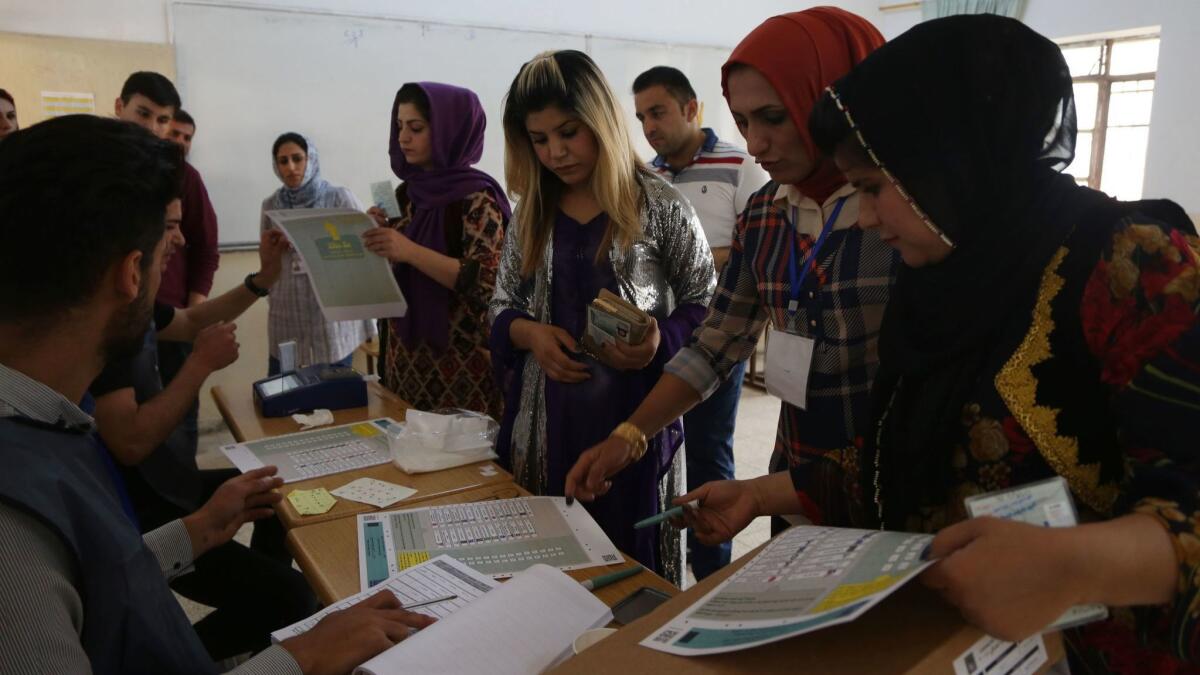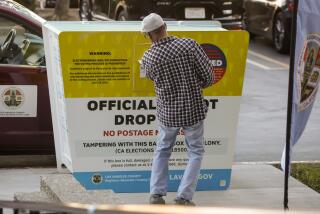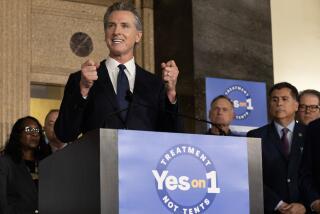Voter turnout low as Iraq holds its first elections since the defeat of Islamic State

Iraqis went to the polls on Saturday to vote in pivotal elections set to determine the country’s post-Islamic State future after a difficult four-year war to defeat the jihadist group.
Few surprises were expected in the battle for 329 parliamentary seats. With almost 7,000 candidates, many of them newcomers, it is expected that familiar faces will emerge victorious. Those political figures have managed — or mismanaged, some would say — the country since the ouster of Saddam Hussein in 2003.
The elections took place in a climate of escalating tensions between the U.S. and Iran, countries that have competing interests in Iraq but have forged an uneasy alliance in the fight to roll back the gains of jihadists established four years ago.
Turnout was low in the early hours of polling, which began at 7 a.m. amid tight security and a car curfew launched at midnight.
In the capital, many voters had to walk long distances to reach polling stations, while children took advantage of what would normally have been traffic-choked streets to skate, cycle or play soccer.
Before noon, Prime Minister Haider Abadi ordered the curfew lifted in what was thought to be a bid to encourage more people to come out to vote, but it appeared to have little effect even with 30 minutes before polls closed at 6 p.m.
“We’ve gotten only about 32% of people registered to this center,” said Nibras Hmood, the head of a voting center in the central Baghdad neighborhood of Karada, where journalists covering the voting process often outnumbered those in the booths.
It seemed little better elsewhere in the country, and unofficial tallies later by Iraqi news outlets confirmed the lowest voter turnout since 2003, with observers estimating a dismal 25% participation rate.
Still, those who made the trek to the polling stations, such as Murtada Sahi, a 22-year-old soldier, insisted on the importance of the vote.
“I voted four years ago and it’s true, we didn’t see any changes, but perhaps we’ll get something this time,” he said as he exited a polling booth set up at the Aqeeda school for girls in the Shiite-dominated Rusafa neighborhood of Baghdad. “We woke up to this world with war, and we’ve seen nothing else since then, but maybe now there will be change.”
Mohammad Najem, 52, a taxi driver who had brought his 9-year-old son, Moussa, to the center, agreed.
“There must be change because this is a new phase for building a new Iraq,” he said. “The new faces in these lists are people who want to work.”
Political figures also urged citizens to come out for the vote.
“The elections are important and they define the future of Iraq,” said Abadi after voting at a center in Karada, according to Iraq’s Sumariyah News.
The sentiment was echoed by Abdul Mahdi Karbalai, the representative of Grand Ayatollah Ali Sistani, who said in a televised interview to Al Iraqiya news channel after voting, “We must not reach a state of despair that makes us give up entirely on correcting the course of the state’s institutions.”
Previous election results had been marred by delays and accusations of fraud.
“The United States congratulates the Iraqi people on today’s parliamentary election,” said U.S. Secretary of State Mike Pompeo in a statement Saturday. “Citizens from every ethnic and religious group, and from all 18 provinces, including those internally displaced, made their voices heard.”
For this election cycle, authorities had instituted a new semi-electronic voting system, with QR-coded electoral sheets and scanners that would automatically tally the votes before transmitting the results via satellite uplink to the Independent High Electoral Commission, the governmental body overseeing the elections.
Yet there were problems, with reports of machines breaking down and a number of people unable to vote because of problems with their identification cards. The devices accept the votes of those whose identity is verified using a chip-equipped voting card that is linked to their fingerprints.
There were also reports of attacks by Islamic State militants, including two suicide bombers who attacked a voting center in the city of Baqubah but were shot by security guards.
Results are expected within 48 hours and will kick off months of furious horse-trading before a government is formed.
“We hope this process moves quickly, and on the constitutional timeline, so that Iraq can continue moving toward a more secure, prosperous and brighter future,” Pompeo said. “The United States stands ready to partner with Iraqi leaders as we continue to build a long-term relationship of cooperation and friendship between our two nations.”
Once in place, parliament will select the prime minister from the country’s Shiite majority.
Current Prime Minister Abadi leads the pack of possible candidates for the office. The West-supported Abadi oversaw the government’s victory over Islamic State and successfully charted a diplomatic course that kept the country out of other regional conflicts.
But he could face stiff competition from powerful, more Iran-friendly leaders with built-in constituencies, including Hadi Ameri, a militia leader headlining an alliance pulled from paramilitary forces that were instrumental in defeating Islamic State, and Muqtada Sadr, the firebrand cleric turned reformist leader who has pushed for a more nationalist, technocratic agenda while allying himself with leftist and communist groups.
Another possible political figure from the past who could ascend is Nouri Maliki, the former prime minister widely blamed for inflaming sectarian grievances during his reign.
Yet, perhaps the biggest challenge facing candidates is the apathy of Iraqis fed up with corrupt politicians whose antics have become textbook examples of government graft, even while residents continue to deal with crumbling infrastructure and shoddy services.
The war against Islamic State saw several of Iraq’s major cities destroyed and millions displaced from their homes; the country now faces a staggering $88.2-billion reconstruction bill, according to the Iraqi Ministry of Planning — funds that donor countries have been unwilling to provide to a government that ranked a dismal 169th out of 180 in Transparency International’s Corruption Index for 2017.
As night came to the capital Saturday, all signs of the election had disappeared.
The thousands of electoral posters that had sprouted over every imaginable surface had already become easy pickings for scrap collectors, and the streets of Baghdad were once again filled with traffic.
Bulos is a special correspondent.
Twitter: @nabihbulos
UPDATES:
3:25 p.m.: This article was updated with a statement from the U.S. State Department.
This article was originally published at 1:40 p.m
More to Read
Start your day right
Sign up for Essential California for news, features and recommendations from the L.A. Times and beyond in your inbox six days a week.
You may occasionally receive promotional content from the Los Angeles Times.







